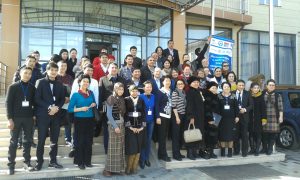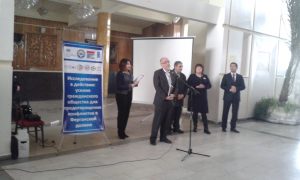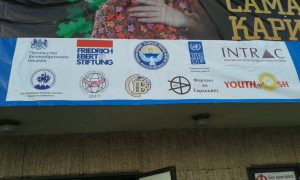By Arantxa Mandiola Lopez and Michael Hammer.
While closely connected to the wider political turmoil in Kyrgyzstan in 2010, the riots in the south of the country bordering with Tajikistan in the Fergana Valley were a stark reminder that the fundamental inter-ethnic and cross-border tensions in the region take long-term efforts to address and diffuse. Limited access to public services for the population, poor education and employment opportunities for young people, unresponsiveness of government – including local government – to the needs of marginalized and vulnerable communities, as well as unresolved border disputes, also today remain part of the regional development challenge in one of the poorest areas in Central Asia.
 Over the past three years INTRAC, in partnership with Centre Interbilim, Jalalabad Civil Society Support Centre, EHIO Khojend and Friedrich Ebert Stiftung Foundation, has worked extensively with a wide range of civil society organisations and individuals in the South of Kyrgyzstan and the Fergana Valley to enhance their capacity to research potential conflicts, improve accountability of local government, as well as lobby for basic rights and services to marginalized and vulnerable communities.
Over the past three years INTRAC, in partnership with Centre Interbilim, Jalalabad Civil Society Support Centre, EHIO Khojend and Friedrich Ebert Stiftung Foundation, has worked extensively with a wide range of civil society organisations and individuals in the South of Kyrgyzstan and the Fergana Valley to enhance their capacity to research potential conflicts, improve accountability of local government, as well as lobby for basic rights and services to marginalized and vulnerable communities.
In a wider perspective this programme looks at putting in place basic conflict resolution systems, promoting fairness in the justice system and ensuring that Governments provide basic functioning services to most of the population in both Kyrgyzstan and Tajikistan.
None of these are minor goals, and for sure, not easy ones. So it was essential to develop the right entry point and ensure that the approach had the support of all major stakeholders involved. Buy-in from local government is as crucial as from civil society actors.
In practical terms INTRAC supported and facilitated a multi-module analytical/ research skills training programme (ASTP) and different Community of Practice events (COP). The objective was to put in place a platform where participants, other civil society experts, government officials and elected deputies in the targeted oblasts and countries could share an understanding of post-conflict and conflict prevention issues.
Research questions addressed by the ASTP participants included how communal services (e.g. utilities, street lighting, waste disposal) can be provided at a local self-government level? Which mechanisms can ensure transparency and accountability? After the 2010 riots, what are the mechanisms for businesses damaged and looted to receive compensation and restore the civic infrastructure destroyed? What about compensation for people disabled during the same riots? How can the community be involved in conflict resolution efforts in cross-border areas or cooperate with District Police Patrols in conflict areas?
 INTRAC’s Central Asia Programme Manager Charles Buxton, translates this combination of issues into a call for interaction across different sectors of society “NGOs have to share their knowledge of youth issues with government”.
INTRAC’s Central Asia Programme Manager Charles Buxton, translates this combination of issues into a call for interaction across different sectors of society “NGOs have to share their knowledge of youth issues with government”.
As the funding of the initiative by the UK Embassy in Bishkek is drawing to a close, the INTRAC Central Asia Office is currently hosting a final conference on the programme in Osh, together with all partners including regional civil society organisations. INTRAC Head of Research, Rachel Hayman, will look at the next steps regarding action research, strategies and research priorities.
The more than 80 participants at the event review together major programme outcomes such as direct policy and public service measures adopted by local governments resulting from civil society lobbying of local and national governments. Measures like better information and access to rights and services for vulnerable, isolated and discriminated communities in no less than 10 conflict areas. The conference also reflects on new projects launched by Civil Society Organisations and/ or international agencies, peace-building initiatives across divided communities, and the NGO “research in action” network launched under the programme. The network aims at making active links with national and international agencies and academic institutions to ensure complementarity, focus on urgent questions for conflict prevention, and widest possible dissemination of results and initiatives.
A special focus of the programme is finding pathways for involving youth in decision-making processes at local self-government level on key policies that directly affect them. Not only are they frequently at the heart of events, processes and causes that contribute to the tensions (e.g. lack of employment, limited juvenile justice provisions and facilities, child labour, lack of extra-curricular education), but they are a key element of civil society empowerment and the future. Young people can contribute to peace-building in border villages and will inevitably be part of and maybe even the core factor in solutions for peace and development in the region.
 Therefore, alongside the conference, a significant part of the final event was the Job Fair “Urgent need for young people!” on 10th February. Close to 500 young people, over 20 employers and various local and national politicians attended, with many more employers advertising vacancies at the fair. Young people participated in workshops on selecting career paths, labour rights and support for the unemployed. This was a first for many of them and generated fascinating additional insights into the perspectives of young people about employment and their employability.
Therefore, alongside the conference, a significant part of the final event was the Job Fair “Urgent need for young people!” on 10th February. Close to 500 young people, over 20 employers and various local and national politicians attended, with many more employers advertising vacancies at the fair. Young people participated in workshops on selecting career paths, labour rights and support for the unemployed. This was a first for many of them and generated fascinating additional insights into the perspectives of young people about employment and their employability.
As always there is still a lot more work to do but the civil society community involved in the programme can be proud of the results achieved and the catalytic effect this initiative has had in improving relationships with local and national government.